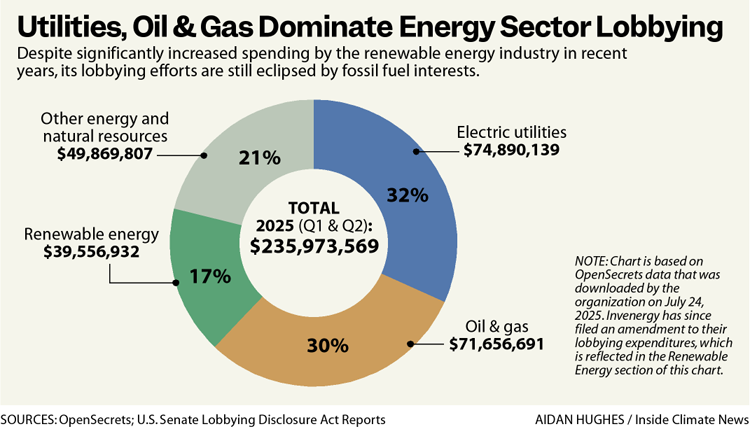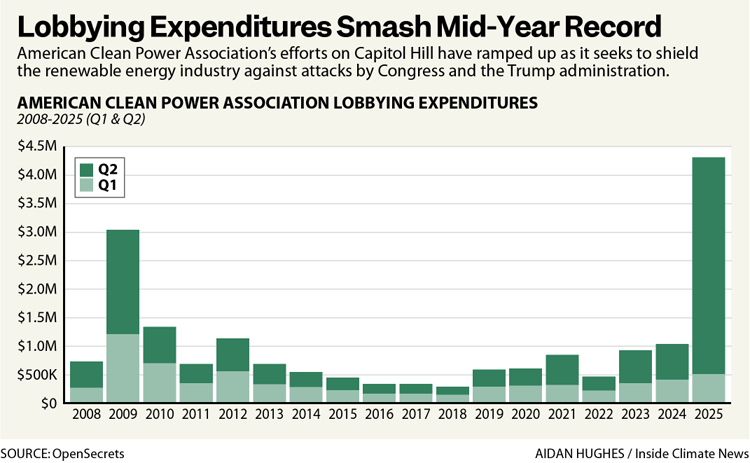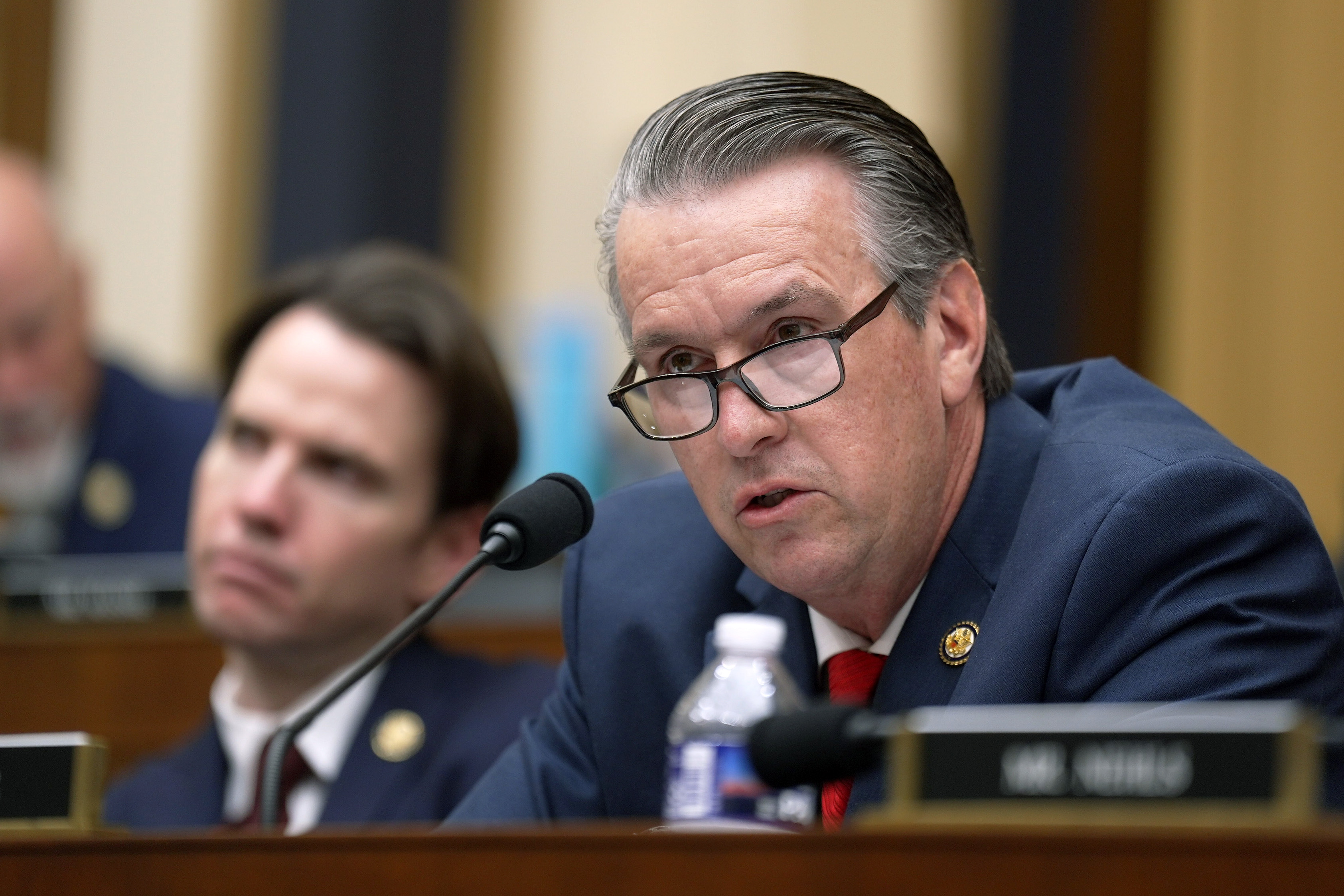The energy and natural resource sector has spent hundreds of millions of dollars lobbying the federal government so far this year, according to data compiled by the nonprofit OpenSecrets.
That spending comes amid a wave of policy wins for fossil fuel interests—and significant setbacks for environmental and green energy groups.
Nearly $240 million poured in during the first and second quarters of 2025, with about 2,200 lobbyists representing the sector—nearly half of whom are former government employees themselves. That spending puts the sector slightly ahead of last year’s pace, when its yearly total reached $435 million.
This year’s expenditures make energy and natural resources the fifth-largest lobbying sector that OpenSecrets tracked over this period—ahead of transportation, defense and labor.
Electric utilities represented the largest share of those expenditures, totaling nearly $75 million.
That’s more than half of what it spent in all of 2024 combined—the industry’s biggest year in over a decade.
And with about $71 million already spent on lobbying this year, the oil and gas industry continues to significantly outpace the renewable industry’s lobbying expenditures of roughly $40 million.
The totals for oil and gas so far this year put the industry slightly below the pace of last year’s expenditures, which totaled over $150 million—its highest since 2009.

However, watchdog organizations say the industry’s steady funding is actually the result of its existing influence within the federal government.
“When you’ve got a White House that has made clear that they’re going to do whatever you want, you don’t have to spend as much money to get results,” said Tyson Slocum, director of Public Citizen’s Energy Program. “They had to spend more when you had bipartisan, shared control over government, and you didn’t have a rubber stamp in the Oval Office. Now they do.”
Since President Donald Trump took office, his administration and Republicans in Congress have pushed through a slew of regulatory and legislative measures fulfilling the priorities of fossil fuel interests, often at the expense of renewables.
The party’s signature legislation, the One Big Beautiful Bill Act, has been criticized as a handout to the fossil fuel industry that increases lease sales for drilling and mandates that millions of acres of federal lands be made available for mining.
Mike Sommers, president of the American Petroleum Institute, told CNBC at the time that the bill “includes almost all of our priorities.”
The administration has also granted Clean Air Act exemptions to dozens of fossil fuel-burning power plants, delaying their need to reduce emissions of mercury and other air toxins.
And the EPA’s announcement that it intends to rescind its “endangerment finding” for greenhouse gases would remove the basis for its ability to regulate emissions from motor vehicles, power plants and oil and gas operations.
These moves have come amid a reversal of government support for renewable energy projects. The One Big Beautiful Bill Act included a phaseout of tax credits for wind and solar that critics say runs counter to the administration’s goal of achieving “energy dominance.”
Wind energy, in particular, has been singled out as a target by the administration. Trump issued a presidential memorandum on his first day in office halting approvals, permits, leases and loans for both offshore and onshore wind projects. The administration later took the unusual step of issuing stop-work orders for some offshore wind projects that were already under construction.
Multiple watchdog organizations told Inside Climate News that the real source of the fossil fuel industry’s current influence stems in part from industry insiders who have been strategically placed into key government positions. That list includes Energy Secretary Chris Wright, a former oil and gas executive, and a range of political appointees with ties to the industry within the EPA.
In an emailed statement, a White House spokesperson did not directly address concerns about administration officials’ ties to fossil fuel interests, but said that “President Trump has kept his Day One promise to unleash American energy, protecting our national security and lowering costs for families and businesses.”
According to Robert Maguire, vice president for research and data at Citizens for Responsibility and Ethics in Washington, those ties have meant that the fossil fuel industry hasn’t had to increase spending on lobbying to secure key wins.
“This has been a hallmark of both [of] Trump’s terms, where essentially he fills his administration with lobbyists and industry officials who, in many cases, have no government experience,” Maguire said. “Their only qualifications for the jobs that he’s putting them in is the fact that they want to do the industry’s bidding within the government.”
A source within the oil and gas industry, however, downplayed the effect of the “revolving door” of industry insiders gaining positions within the government, and instead emphasized that Trump came into office with an already-friendly attitude toward oil and gas.
The source, who requested anonymity to speak freely on the topic, said that industry lobbyists have had conversations with people in government who are “more engaged or more willing to talk for any number of reasons,” saying that there is “expertise” within the current administration on matters tied to the oil and gas industry that didn’t exist during the Biden administration.
Although the source emphasized that the industry has still fought difficult policy battles this year, including over tax credits for clean hydrogen projects, they said that this expertise has meant that industry lobbyists haven’t needed to spend as much effort educating lawmakers or officials on key issues.
This story is funded by readers like you.
Our nonprofit newsroom provides award-winning climate coverage free of charge and advertising. We rely on donations from readers like you to keep going. Please donate now to support our work.
Donate Now
Utilities, meanwhile, continue to have a “massive” amount of influence in D.C., according to David Pomerantz, executive director of the watchdog Energy and Policy Institute.
But he noted that far fewer utility insiders have been appointed to positions within the federal government during Trump’s second term.
And unlike the oil and gas industry, the agendas of various utility companies are more complex, and sometimes reveal significant differences between what utilities want and what the Trump administration wants.
“Where the utilities are lobbying for policies or regulatory changes that will allow them to burn more coal and gas, they’re successful,” Pomerantz said.
“The EPA basically said, ‘If you want waivers so that you do not have to comply with pollution limits, all you have to do is send us an email.’”
Still, Pomerantz said that not all utility companies sought out those exemptions—and that some utilities have also lobbied unsuccessfully against some of the Trump administration’s anti-renewables policies.
“Even [with] their considerable political power notwithstanding, the utilities have tried … to prevent some of the worst attacks on wind and solar,” Pomerantz said, “and they’ve basically failed at every turn.”
Although the renewable energy industry continues to lag behind oil and gas, its spending so far of roughly $40 million puts it on pace to eclipse last year’s record of $63.7 million.
This year’s spikes are driven in part by massive increases from the renewable industry’s top spender—the American Clean Power Association (ACP).


ACP’s expenditures in the second quarter of 2025 alone, which reached $3.8 million, were nearly twice the amount the trade association spent in all of 2024 combined.
The $4.3 million it has spent so far this year places it ahead of any of the oil and gas industry’s trade associations. The American Petroleum Institute, by comparison, spent just under $4 million, while American Fuel & Petrochemical Manufacturers spent less than $3 million
But Slocum, director of Public Citizen’s Energy Program, suggested that ACP’s efforts have been unsuccessful.
“The American Clean Power Association sort of is on the outside looking in, and I’m not sure that any amount of money is going to be able to overcome this,” he said.
Slocum also said that the association had “badly misjudged their strategy” by assuming they could appeal to both Democrats and Republicans.
“They thought that they could build a bipartisan appeal for renewable energy, and you see that with a few senators like [Chuck] Grassley and [Lisa] Murkowski, but for the most part, you know, mainstream Republicans just do not want to challenge Trump publicly,” Slocum said.
In an emailed statement, ACP suggested that its efforts on Capitol Hill helped the renewable energy industry avert even worse outcomes—and defended the association’s attempts to build bridges with key Republican legislators.
“The ability to successfully remove the destructive excise tax [from the One Big Beautiful Bill Act] and secure a more reasonable phase out of clean energy tax credits required a sophisticated response to underscore the impact of these policies on consumers and the communities we represent,” said Jason Grumet, the CEO of ACP.
“Despite the highly polarized environment, a group of Republican senators came forward to support the core interests of the clean energy industry,” Grumet said. “Securing this support for provisions that the entire Republican caucus originally voted against is an important accomplishment.”
About This Story
Perhaps you noticed: This story, like all the news we publish, is free to read. That’s because Inside Climate News is a 501c3 nonprofit organization. We do not charge a subscription fee, lock our news behind a paywall, or clutter our website with ads. We make our news on climate and the environment freely available to you and anyone who wants it.
That’s not all. We also share our news for free with scores of other media organizations around the country. Many of them can’t afford to do environmental journalism of their own. We’ve built bureaus from coast to coast to report local stories, collaborate with local newsrooms and co-publish articles so that this vital work is shared as widely as possible.
Two of us launched ICN in 2007. Six years later we earned a Pulitzer Prize for National Reporting, and now we run the oldest and largest dedicated climate newsroom in the nation. We tell the story in all its complexity. We hold polluters accountable. We expose environmental injustice. We debunk misinformation. We scrutinize solutions and inspire action.
Donations from readers like you fund every aspect of what we do. If you don’t already, will you support our ongoing work, our reporting on the biggest crisis facing our planet, and help us reach even more readers in more places?
Please take a moment to make a tax-deductible donation. Every one of them makes a difference.
Thank you,

















